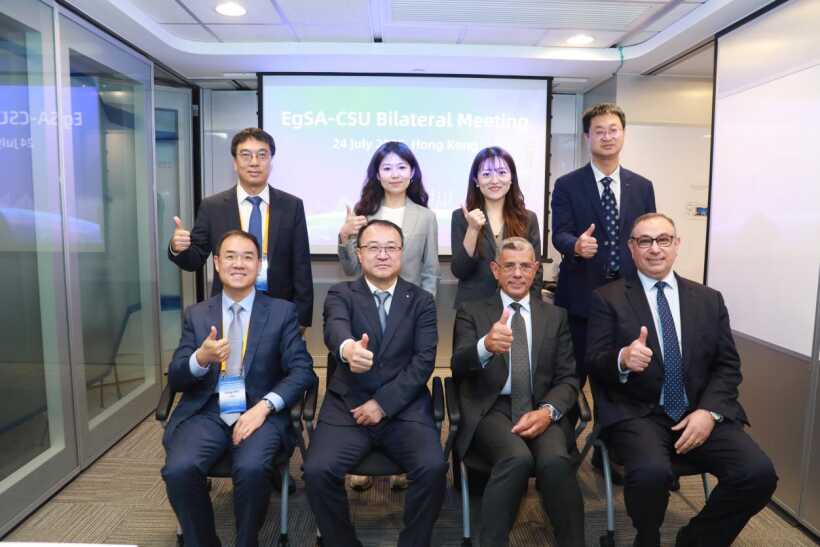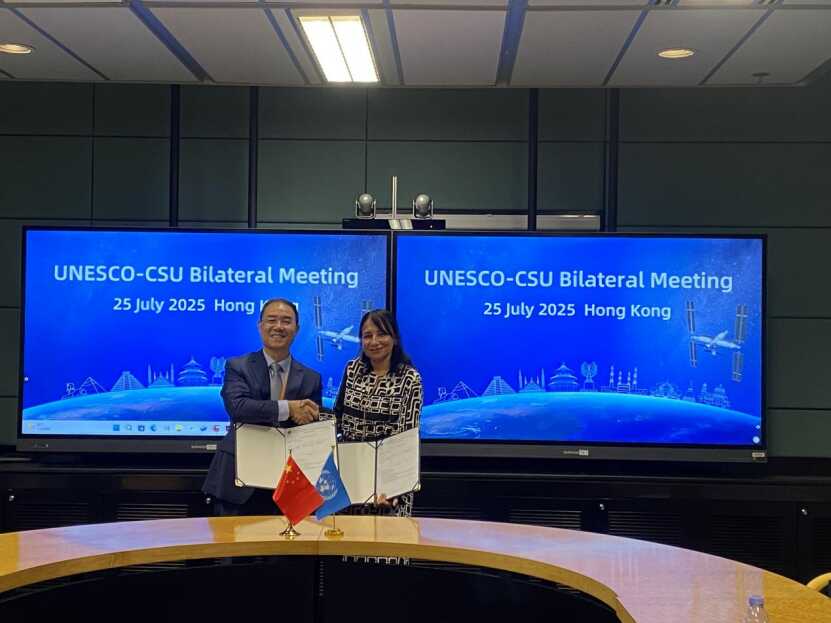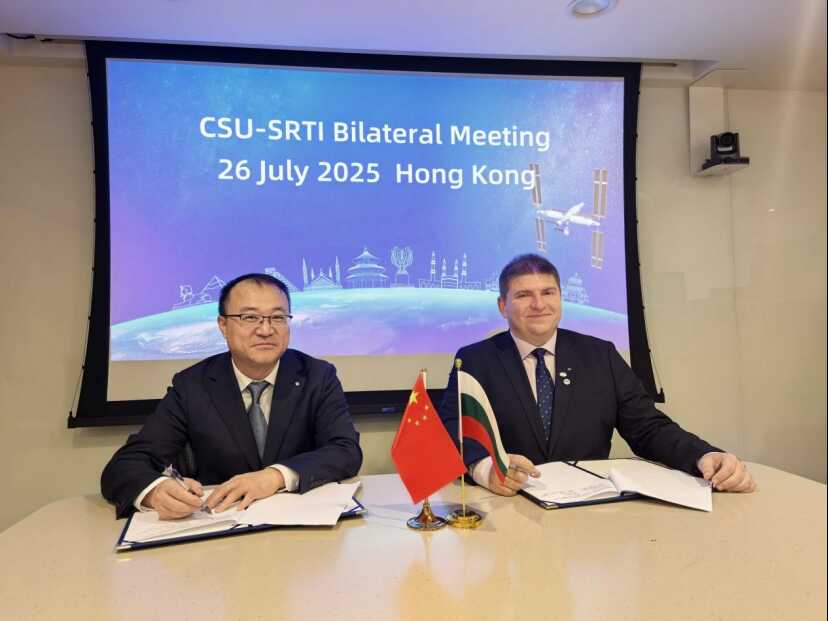During the 2nd Belt and Road International Training Workshop on Space Science and Utilization held in Hong Kong, the Technology and Engineering Center for Space Utilization of the Chinese Academy of Sciences (CSU hereinafter) proactively broadened its global partnerships. From July 24th to 26th, 2025, CSU successfully convened three significant bilateral cooperation meetings. These were respectively with the Egyptian Space Agency (EGSA), the United Nations Educational, Scientific and Cultural Organization (UNESCO) and the Space Research and Technology Institute of the Bulgarian Academy of Sciences (SRTI). The purpose of these meetings was to foster open sharing and practical cooperation within the realm of space science and utilization.
CSU and EGSA Delve into Fresh Prospects for Space Science and Utilization Collaboration in Bilateral Encounter
On the afternoon of July 24th, the Technology and Engineering Center for Space Utilization, CAS (CSU) held its first official bilateral meeting with the Egyptian Space Agency (EGSA). Wang Qiang, the Acting Director - General of CSU, along with Lyu Congmin, the Deputy Director - General of CSU, engaged in in - depth exchanges with a delegation led by Sherif Sedky, the CEO of the Egyptian Space Agency.
Both sides reviewed their past communication accomplishments and held constructive discussions regarding potential cooperation in the domain of space science and utilization. Particular attention was paid to material science, Earth observation, payload technology validation, and the joint cultivation of space science and technology talent for the African region.
The meeting culminated in a consensus on establishing an efficient cooperation - promotion mechanism, with the aim of laying a solid groundwork for future substantial project collaborations. Acting Director - General Wang Qiang underscored the significance of the Chinese Space Station as an open platform for scientists worldwide, expressing his anticipation of jointly exploring the mysteries of space with the Egyptian Space Agency.

Figure 1 Group Photo of the Bilateral Meeting between CSU and EGSA
Teaming up with UNESCO to Propel Science - driven Sustainable Development
On the morning of July 25th, Lyu Congmin, the Deputy Director - General of the Technology and Engineering Center for Space Utilization (CSU), and Amal Kasry, the Director of the Division of Basic Sciences and Engineering at UNESCO, co - chaired a bilateral meeting. Conducted in a highly constructive ambiance, the meeting delved into multiple avenues of cooperation. The objective was to harness the power of space science and utilization to propel global sustainable development.
The discussions centered on crucial aspects of bolstering capacity - building in developing countries. These included facilitating the remote sharing of laboratory equipment, intensifying the nurturing of scientific and technological innovation talent, enhancing the inclusion of youth in STEM (Science, Technology, Engineering, and Mathematics) disciplines, leveraging space science to tackle resilience - related challenges and further the Sustainable Development Goals (SDGs), and exploring potential partnerships in cutting - edge technologies such as quantum science.
Both parties stressed the significance of deepening their collaboration within the framework of the UN's International Decade of Science for Sustainable Development. They reached an accord on future joint initiatives and sealed a memorandum. This aimed to optimize the contribution of the Chinese Space Station as a global research platform, thereby significantly advancing the realization of the Sustainable Development Goals.

Figure 2 Signing Ceremony Scene of the Cooperation Minutes between CSU and UNESCO
CSU and SRTI Sign Cooperation MoU, Strengthening Space Science Collaboration
On the morning of July 26, a bilateral seminar between the Technology and Engineering Center for Space Utilization (CSU) and the Space Research and Technology Institute of the Bulgarian Academy of Sciences (SRTI) was successfully held. During the event, a Memorandum of Understanding (MoU) on cooperation was officially inked. Wang Qiang, the Acting Director - General of CSU, Lyu Congmin, the Deputy Director - General of CSU, and Simeon Asenovski, the Deputy Director of SRTI, jointly participated in this momentous meeting and signing ceremony.
Building on previous consensuses, both sides explicitly conveyed their enthusiasm for collaboration in the domain of space science experiments. Specifically, they recognized promising opportunities for joint research in frontier areas such as fundamental physics, space life sciences, and human - related studies. The signing of this MoU marks the formal establishment of a well - organized cooperation framework between the two institutions. Looking forward, they plan to jointly promote mutually beneficial cooperation projects through annual meetings, joint working groups, and multi - level personnel exchange mechanisms. Deputy Director Simeon Asenovski, who also spoke on behalf of the training course participants, expressed his gratitude for this opportunity to deepen cooperation.

Figure 3 Signing Ceremony of the MoU on Cooperation between CSU and SRTI
The series of bilateral meetings held in Hong Kong are significant initiatives by CSU. By wholeheartedly embracing the principle of open cooperation, CSU aims to expand its global footprint in space science and utilization. The in - depth exchanges and achievements reached with the Egyptian Space Agency (EGSA), the Space Research and Technology Institute of the Bulgarian Academy of Sciences (SRTI) , and the United Nations Educational, Scientific and Cultural Organization (UNESCO) have not only fortified existing partnerships but also laid a solid foundation for future international cooperation in space science and utilization on a broader scale and at a deeper level.
CSU will continue to capitalize on the Chinese Space Station, a national space laboratory platform, to collaborate with international partners. Together, they will venture into the exploration of the unknown universe, share the benefits of space utilization, and contribute to the peaceful use of outer space and the progress of sustainable development for humanity.
File Download: